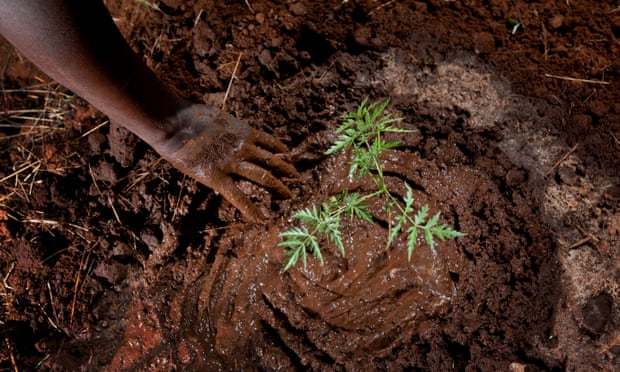 |
| A seedling of the Melia Volkensii tree is planted in the village of Nyumbani in Kitui, Kenya, one of 14 African countries so far involved in the AFR100 initiative. Photograph: Ben Curtis/AP |
More than a dozen African countries have joined an “unprecedented” $1.6bn (£1bn) initiative to boost development and fight climate change by restoring 100m hectares (247m acres) of forest across the continent over the next 15 years.
The African Forest Landscape Restoration Initiative – known as AFR100 – was launched on Sunday at a Global Landscapes Forum meeting during the Paris climate change conference.
It will be underpinned by a $1bn investment from the World Bank in 14 African countries over the next 15 years and by $600m of private sector investment over the same period.
The initiative will also be supported by Germany’s Federal Ministry for Economic Co-operation and Development, the New Partnership for Africa’s Development (Nepad) and the World Resources Institute.
To date, Ethiopia, the Democratic Republic of the Congo, Kenya, Niger, Uganda, Burundi and Rwanda have between them committed more than 42m hectares of land for forest landscape restoration, an area larger than Zimbabwe or Germany.
Cameroon, Liberia, Madagascar, Malawi, Congo-Brazzaville and Togo have also committed to forthcoming hectare targets as part of the AFR100.
Participants point out that forests and trees contribute to African landscapes by reducing desertification and improving soil fertility, water resources and food security, as well as by increasing biodiversity and the capacity for climate change resilience and mitigation.
They say the initiative will not only help to build on existing climate pledges made by African countries, but will also provide an engine for economic growth and development.
“Restoring our landscapes brings prosperity, security and opportunity,” said Dr Vincent Biruta, Rwanda’s minister of natural resources.
“With forest landscape restoration we’ve seen agricultural yields rise and farmers in our rural communities diversify their livelihoods and improve their well being.”
The commitments made through AFR100 will build on the Bonn challenge – launched four years ago – which aims to revitalize 150m hectares of land by 2020, and the New York Declaration on Forests, which pushes the target up to 350m hectares by 2030.
The new initiative is intended to capitalise on “a strong tradition” of successful forest landscape restoration in Africa: local communities in the Tigray region of Ethiopia have already restored more than 1m hectares, while in Niger, farmers have improved food security for 2.5 million people by increasing the number of on-farm trees across 5m hectares of agricultural land.
Dr Ibrahim Assane Mayaki, the CEO of Nepad and former prime minister of Niger, said that countries such as Malawi, Ethiopia and Mali were already reaping the benefits of restoration, but added: “We need to scale up restoration across the whole continent - more than 700m hectares of land in Africa have potential for restoration.”
Wanjira Mathai, chair of the Green Belt Movement and daughter of the Nobel peace prize laureate Wangari Maathai, said: “The scale of these new restoration commitments is unprecedented.










No comments:
Post a Comment